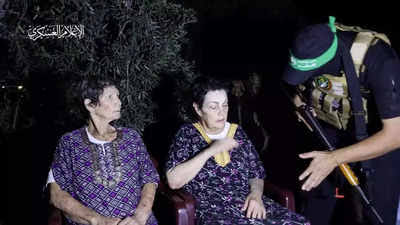Yocheved Lifshitz, a 85-year-old Israeli woman who had been held captive by Hamas for two weeks, recently spoke about her ordeal and treatment while in Gaza. She and another elderly woman, 79-year-old Nurit Cooper, were released on “humanitarian” grounds as part of a deal agreed by Qatar and Egypt.
Lifshitz described the distressing experience during her abduction, where she was beaten by her captors as they transported her to Gaza on a motorcycle on October 7. She shared, “During the motorcycle ride, my head was forced to one side, while the rest of my body was on the other. The young men who took me had struck me during the journey. Although my ribs remained intact, the pain was significant, and I experienced breathing difficulties.”
However, once she arrived in Gaza, Lifshitz noted that her captors treated her and other captives well. They provided them with the same food they ate and even arranged for a doctor to provide medical care. She expressed gratitude for their gentleness and the provisions they received during their captivity. She also mentioned that her captors appeared well-prepared for the situation, having essential supplies for both men and women, including shampoo. She shared her reason for shaking the hand with one of her captors at the moment of her release.
Lifshitz, who resides in the Nir Oz kibbutz near the Gaza Strip, commented on the security fence separating Gaza from southern Israel, saying that Israel’s military had underestimated the threat posed by Hamas, and the costly security fence had proven ineffective.
The release of Lifshitz and Cooper comes after Hamas’s October 7 attack on Israel, during which they breached the security fence, leading to multiple casualties and numerous captives. Currently, many individuals, including foreigners and dual nationals, remain in captivity in the crowded Palestinian enclave.
The situation has led to heightened international concern, with calls from world leaders for prioritizing the release of captives. French President Emmanuel Macron, during his recent visit to Israel emphasized the importance of securing the release of captives, including French nationals, as the “first objective.” U.S President Joe Biden expressed his openness to ceasefire negotiations but underlined that the release of all captives should be a precondition. The families of Israelis who are missing or being held captive have also emphasized the need to prioritize the captives’ release. They believed that this should be the top priority rather than focusing on the goal of “obliterating Hamas” or controlling Gaza.
The situation remains tense as Israel prepares for a potential ground assault into Gaza, and Palestinians in the northern part of the territory have been ordered to evacuate, with the advice that failing to comply may lead to them being considered “associates of terrorism.”

